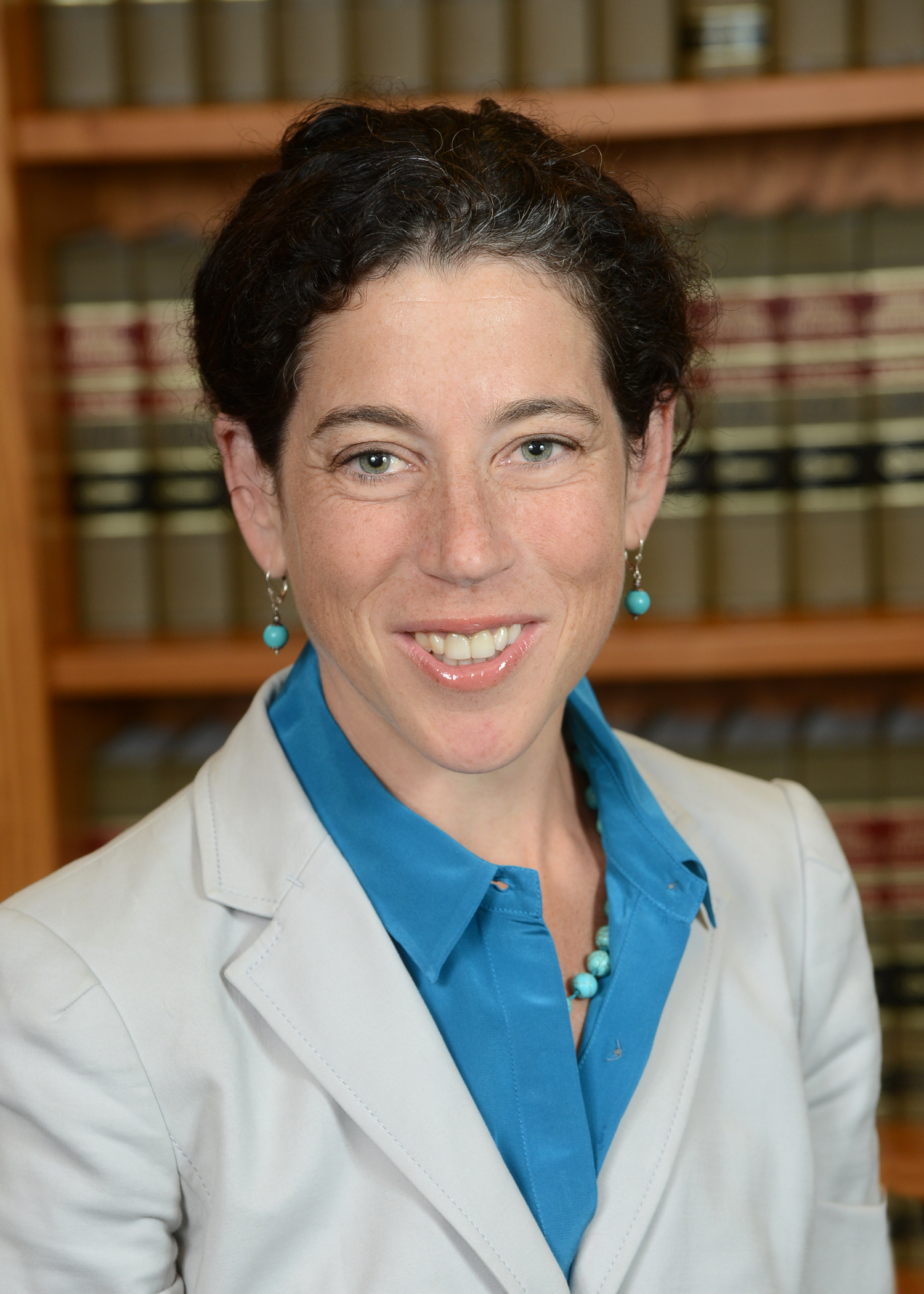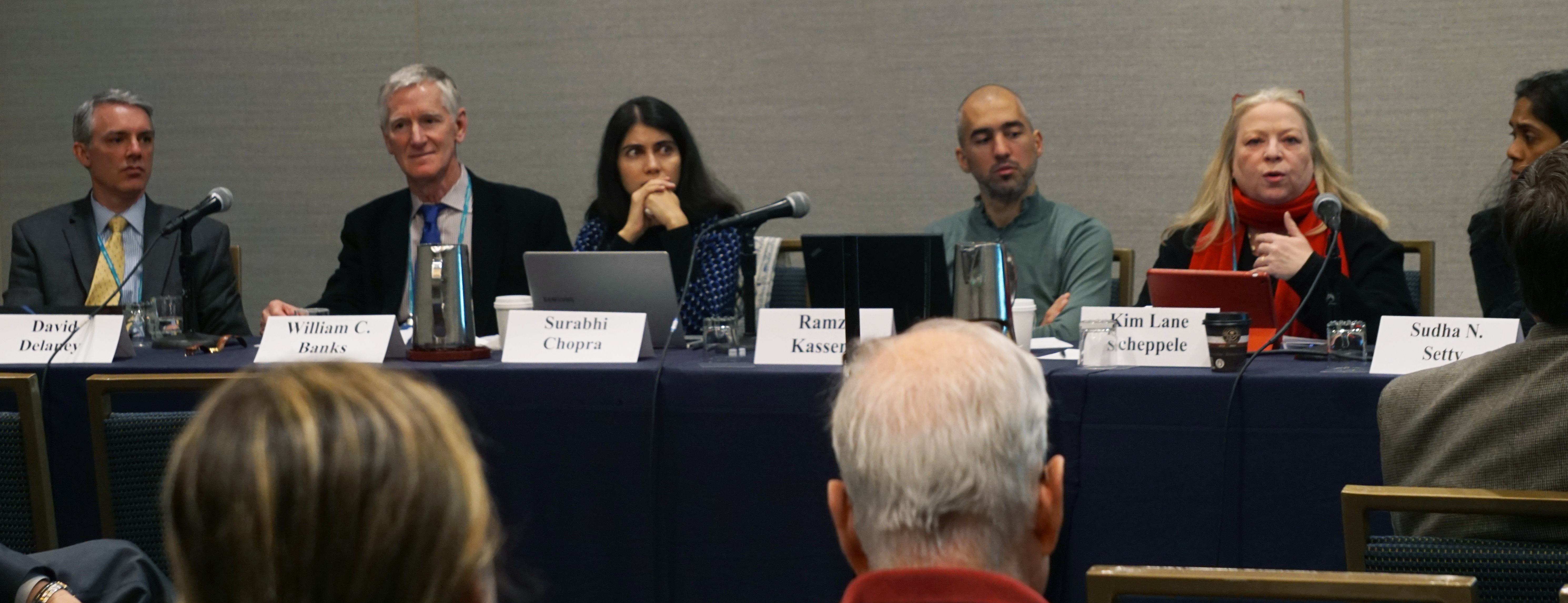The Section on National Security Law provides for the exchange of information among, and the professional development of, law school faculty members interested in and involved with the laws governing national security.
 Chair: Jennifer Daskal, American University, Washington College of Law
Chair: Jennifer Daskal, American University, Washington College of Law
 Chair-Elect: Rachel VanLandingham, Southwestern Law School
Chair-Elect: Rachel VanLandingham, Southwestern Law School
What can you tell us about the membership of the AALS Section on National Security Law and their work?
Jennifer Daskal: There are a growing number of national security law scholars at schools across the country, and we have seen real growth in our membership over the years as a result. Our primary focus is on the programming that takes place at the Annual Meeting. In 2018, we have two events planned. The first includes a stellar group of panelists: Avril Haynes, the former Deputy National Security Advisor; Gen. John R. Allen, a retired four-star general who was Commander of the International Security Assistance Forces and U.S. forces in Afghanistan; Oona Hathaway, a Yale Law School professor and former Special Counsel to the General Counsel at the Department of Defense; and Heidi Kitrosser, a renowned Minnesota Law School professor who was recently awarded a Guggenheim Foundation Fellowship. That panel, which is titled “National Security in a Time of Trump,” will address the latest and greatest national security issues come January 2018.
Rachel VanLandingham: The second panel focuses on works-in-progress by junior scholars—those who have fewer than seven years in the academy. When we held [this program] last year, which was the first time, we chose articles from a call for papers that were not yet published, so we truly made it a works-in-progress to help scholars improve their papers. We had articles on cyber security, as well as articles regarding particular methods that the FBI uses and how they contravene, or seem to contravene, international law. Disparate topics, but exciting. We had a good turnout for the panel last year and great interaction. The format will be the same this year: we’ll select papers from a call, then assign a discussant to present the paper and highlight components of it to the general audience. Then the junior scholar gets a chance to respond. That’s a little different from a traditional works-in-progress session.
What are the important conversations happening right now in legal education regarding national security?
JD: I think it’s an important and exciting time to be working in the field and to be engaging with other scholars and teaching students. This field existed before September 11, 2001, but only a small number of scholars engaged in the field. After the attack, the prominence of national security blossomed. I think we’re at a significant point right now where a lot of scholars, commentators, and students are focused on what’s happening with the current administration and looking at the wide array of national security threats and the ways in which claims of national security have been used to justify a host of disparate policy responses. You see national security scholars and former government officials—who often were scholars before they went into the government and continue to teach after they leave government—writing briefs and otherwise engaging in a whole range of issues from immigration to use of force to surveillance to foreign relations. The voices of people who have studied or are studying these issues are more important than ever.
RV: I have more of an anecdotal, personal observation about being at a law school that is not on the East Coast, and not at the epicenter of politics as Washington, D.C. is. I am in Los Angeles at a law school that is known more for entertainment law. When I asked to teach this course when I got here three years ago, it had not been taught in years, so I’ve been pleasantly surprised by the interest and by the number of students in my classes.
Even more importantly, I love the fact that so many students become interested in federal government service after taking this class. They had no idea what was out there because they grew up and went to school in Los Angeles and are focused on the things that don’t have anything to do with federal service. I believe there’s a nexus between exposure to national security law and the many subjects it covers and federal service. I’ve had a few students from my national security law course who have applied to become judge advocates in the military. One former student is interning for the Department of Homeland Security. I have another student interested in the CIA, and they said they’d never considered it before taking National Security Law. I would hazard a guess that’s not unique to Southwestern Law. This kind of course is good exposure for different kinds of service and employment that individuals wouldn’t have considered otherwise.
JD: I think one of the most exciting and challenging aspects of national security law is that it’s so broad. People can enter the field with an array of different expertise and interests. You could have a national security law class focused on any one of a number of topics—such as cyber security, energy policy, environmental policy, immigration law, international law, or, surveillance policy. Or a class that tries to do it all. That means the faculty members who are engaged in this section come at it with all kinds of perspectives and expertise. It also means that there’s a lot of room for innovation in teaching. And there here are many opportunities for students to get engaged in the issues from a variety of perspectives as well.
Do you collaborate often, either as a section with other sections or personally within your scholarship, with scholars in other fields?
JD: There are very few faculty members who are purely national security law scholars. Most national security faculty come at it with some other substantive expertise. For me, it’s criminal law, constitutional law, and national security law. For others, it’s international law and national security law. I think most of us are actively engaged in conversations in other substantive areas of the law in addition to the conversations that are more exclusively focused on national security.
How do you choose, with so many angles and points of entry, what to cover or not cover in national security law survey courses?
RV: For a lot of us, we teach what we’re comfortable with because we’re coming in with pre-existing work expertise in certain areas, as well as having expertise gleaned from one’s complementary teaching load. This is purely anecdotal, but I know quite a few folks who teach national security law and have professional government or human rights experience, so they focus on those areas. Another thing that’s neat about teaching this course: there are more casebooks now than there ever have been, and most of them are quite comprehensive. You can pick the subjects for that particular semester that are the most topical given current events. For a while, drone warfare and the use of drones was a topic of huge interest, so professors would tie in this interest when teaching relevant legal frameworks in national security law. I think there are many different ways to go about it, and it would be beneficial to folks teaching and writing to discuss what they teach and develop best practices. I think our section is uniquely poised to do that kind of work.
JD: Because the topic is so broad, I think a lot of teachers end up ultimately coming up with their own materials instead of using a casebook.
What has it been like to teach and focus your scholarly efforts on national security during a period when there are many proposed and implemented changes in the field by the current administration? What are some of the more interesting developments or lessons you have observed in this period of change?
RV: I haven’t taught it yet since President Trump was elected—I teach it in the fall, so we were just finishing up when the election happened. I think it’s going to be interesting, but I think it’s always interesting with national security law. There are always things in the news that are quite relevant. I don’t think that is going to change. Maybe it will be amplified or people will notice it a bit more. National security has been on the agenda and on the national consciousness, especially in the post-9/11 world in which we have been at war for the entire duration.
What do you see still playing out?
JD: Scholars can have a voice and influence in developments going forward in the whole range of areas from cybersecurity to surveillance policy to questions about use of force. These are not all new issues, but changes in technology, power structures, and threat vectors require a re-evaluation, in some cases, of the adoption of old rules to new circumstances. That makes the field incredibly exciting and relevant. I expect, for better or for worse, that it will stay that way for quite some time.
Do you think there will be an increased interest in national security law classes from students?
RV: I started getting questions about the travel ban from students in my criminal law and criminal procedure classes this spring. I tried to answer the questions while putting a plug in and would say, “If you’d like to be able to answer these yourself, take my national security law class!” I think there is already greater awareness of national security law issues, especially with regard to its nexus to immigration, for example. This connection between immigration and national security law is raising students’ awareness that national security law encompasses a wide swathe of legal and policy issues. I see my students currently grappling with such connections in criminal procedure, where they’re making connections among surveillance, criminal procedure, and the federal government under the auspices of national security—which fuels an interest in national security law.
How do your section members interact and collaborate outside of the AALS Annual Meeting?
RV: Several of us share our works-in-progress with each other informally for feedback.
How does your section support the scholarship of your members?
JD: The works-in-progress session [at the Annual Meeting] is the primary formal support. There are many other informal mechanisms by which people communicate with each other. Since people in our section have far ranging expertise, there’s no single body of knowledge that everybody shares in the same way. Through informal networks, people tend to find the other members that are interested in the same aspects of national security law, communicate with them and bounce ideas off of them.
What does your section do to recognize new scholars or particularly great scholarship from longtime members?
RV: We’ll be unveiling a new award at the January meeting. It’s to honor Professor Mike Lewis at Ohio Northern University, a retired naval officer who wrote quite a bit on international humanitarian law and law of war issues who passed away. The section, along with several different universities, are sponsoring a scholarship award in his honor. The scholarship is linked to the subject matter and area he wrote in: the law of war. That’ll be our first reoccurring annual award for scholarship specifically in honor of a former member of the section.
What improvements to law school curricula have you seen as a direct or indirect result of the work of this section? How has the study of national security law changed since you’ve been teaching it?
JD: I don’t know how much you can trace it to our section, but I think before September 11, 2001, only a very small number of schools taught national security law and a very small handful of scholars existed. Now, just about every school in the country has some sort of national security law class and many schools, like ours, have multiple classes. We’ve also seen a proliferation of journals. There’s the Journal of National Security Law and Policy, a peer-edited journal that a number of our members are on the editorial board and review the submissions. There is a journal of national security law at Harvard now as well. You also now see national security law-related articles in many of the mainstream journals.
What is your vision for the section, this year and in the years to come? What new initiatives, project-based or ongoing, would you like to see as part of the section?
JD: I’m hopeful there’ll be a strong turnout at the AALS Annual Meeting because we have such a great program, and that will continue to facilitate the formal and informal networks. The community of national security scholars is a very supportive and warm group of scholars. I’m hopeful and fully expect that to continue over the next year.
RV: I would like to encourage discussion about curriculum, books, and different teaching methods currently used. As Jen mentioned, some of the larger schools, especially on the east coast and in Washington have numerous national security law courses, whereas other schools have one such course. It can be rather overwhelming to try to navigate the numerous issues that we’re all excited about as scholars, but as a teacher, of course you have to limit it to what is manageable in a three-credit class. I would love to have a discussion about what’s the best approach or approaches to use in teaching such a course. That is, more of a structured discussion and dialogue regarding approaches for a basic survey course on national security law.
 National Security Law panel at the 2017 AALS Annual Meeting
National Security Law panel at the 2017 AALS Annual Meeting
AALS Sections provide opportunities for law school faculty and staff to connect on issues of shared interest. Each of the 102 AALS sections is focused on a different academic discipline, affinity group, or administrative area. For a full list of AALS sections and information on how to join, please visit aals.org/services/sections.